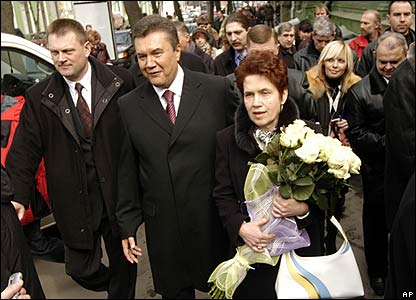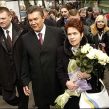Three recent episodes reflect the degree to which the rule of law in Ukraine is under pressure from its already weak position after five years of instability under former President Viktor Yushchenko. This growing pressure on the rule of law comes after President Viktor Yanukovych has been in office for only nine months. On September 14, the Prosecutor-General’s Office concluded that the only person who ordered the murder of journalist Georgi Gongadze in September 2000 was the Interior Minister, Yuriy Kravchenko. Gongadze’s decapitated body was re-buried in such a way for it to be found, as it was in November 2000, leading to what became known as the Kuchmagate crisis.
Kravchenko committed “suicide” in March 2005 on the day he was set to give evidence to the Prosecutor-General’s Office. Kravchenko’s “suicide” has been in doubt ever since as he died from two gunshots to the head. The verdict has been ridiculed by Kravchenko’s friends and foes alike as a whitewash orchestrated by its organizers. Volodymyr Melnykov, General Oleksiy Pukach’s superior in the interior ministry, did not believe that Kravchenko gave the order to Pukach. Pukach admitted murdering Gongadze and was captured last year, after five years in hiding (Komersant-Ukraina, September 27).
Gongadze’s mother and widow both rejected the prosecutor’s findings. Meanwhile, the head of the Presidential Administration, Serhiy Levochkin, supports Kuchma’s innocence, contradicting the stance adopted by the Deputy Head of the Presidential Administration, Hanna Herman (Hazeta po-ukrainski, September 17, Ukrayinska Pravda, September 20).
Kuchma repeated the canard that the Gongadze scandal was a CIA operation to unseat him. CIA agents participated in protests after the disappearance, as Kuchma claimed: “It is an international scandal designed to compromise Ukraine.” US Ambassador, John F.Tefft, rejected the accusations, as did Ambassador Carlos Pasqual when these claims were first made in 2001 (Kyiv Post, September 23).
An additional legal regression was the de facto closure of the investigation of the poisoning of the then opposition candidate, Viktor Yushchenko, in September 2004. The head of the prosecutor’s special team investigating the poisoning, Halyna Klymovych, resigned in March 2010 and gave her first long interview to Ukrayinska Pravda (September 27, 28). Klymovych re-affirmed the conclusion reached by the Prosecutor-General, Oleksandr Medvedko, that Yushchenko had been poisoned –the only occasion when Russia has intervened in a democratic revolution to assassinate an opposition leader. Klymovych resigned from the prosecutor’s office because the “current authorities will do everything to conceal the fact of the poisoning and this objective will be for them a priority” (Ukrayinska Pravda, September 27).
The third –and most important– legal setback was the constitutional court’s decision on October 1, to declare the 2004 constitutional reforms (which transformed Ukraine into a parliamentary system and came into effect following the March 2006 parliamentary elections) as “unconstitutional.” As a consequence of the annulment, Ukraine has returned to the 1996 presidential constitution.
The court’s ruling has thrown Ukraine into constitutional and legal chaos. The Parliamentary Assembly of the Council of Europe (PACE) issued a strongly worded statement: “The functioning of democratic institutions in Ukraine’ five days later that was voted through by 102 out of 109 members, the highest majority vote ever recorded by PACE” (https://assembly.coe.int/main.asp?Link=/documents/workingdocs/doc10/edoc12357.htm).
Constitutional-legal chaos arises from four questions following five years of Ukraine being under an “unconstitutional” constitution:
1. Legislation will need to be amended.
2. Three elections (2006, 2007, 2010) were held under an “unconstitutional” constitution.
3. Yanukovych was elected under the 2006 “constitution” for five years but the presidential term was four years under the 1996 constitution.
4.Parliament was elected in 2007 for five years, but the 1996 constitution provides for a four year parliamentary term.
The court’s ruling and the threat of presidential authoritarianism has for the first time raised the genuine possibility of unity among opposition forces. Yanukovych, the Party of Regions he led in 2003-2010, and Deputy Prime Minister Sergei Tigipko have supported Ukraine’s return to a presidential system using the same rationale used in the 1990’s: a concentration of power is needed to undertake reforms. They failed to take into account that a presidential system has been synonymous with democratic regression, authoritarianism and weak reforms throughout the CIS. All Central-Eastern European and Baltic post-communist states, that conducted the greatest number of reforms and advanced towards democratic systems and market economies, adopted parliamentary systems. Mikhail Pogrebynsky, Director of the Kyiv Center for Political and Conflict Studies, and an opponent of the Orange political camp, concluded that “Ukraine’s system is moving closer to the Russian system of power” (Christian Science Monitor, October 1). Russian-style presidential power will move Ukraine away from European integration.
Indeed, speaking at the seventh Yalta European Strategy on June 18, Yanukovych did not state that his aim was to seek EU membership, a factor in conveying the wrong signal to European and American elites who were present (Ukrayinska Pravda blog, October 4). A resolution for Ukraine to officially apply for EU membership received only 61 votes (Ukrayinska Pravda, October 6). Ukrainian media sympathetic to the opposition were unanimous in their pessimism about the deterioration in Ukraine-EU relations (Hazeta po-Ukrainski, September 14, Komentari, March 12, May 28, June 18, September 17).
The court’s decision deepens already skeptical views in Brussels and Strasbourg that Yanukovych is disinterested in EU membership. Speaking at Harvard University, the EU’s High Representative for Foreign Affairs and Security Policy, Catherine Ashton said: “Ukraine does not see itself in the EU, but sees itself as part of Europe’s identity” (Ukrayinska Pravda, September 28). European Peoples Party (EPP) MP, Michael Haller Gahler, described Ukraine as retreating backwards, “returning to Sovietization” (Ukrayinska Pravda, September 23). In September, the EPP and EU issued critical statements of democratic regression in Ukraine (https://www.epp.eu/press.asp?artid=1447&fullview=1, Ukrayinska Pravda, September 17).
The prosecutor’s ruling on the Gongadze murder enables the Yanukovych administration to control Kuchma, and thereby his son-in-law oligarch, Viktor Pinchyuk, and Lytvyn, who received the position of Parliamentary Chairman and the eponymous bloc, defected to the ruling coalition. Three senior members of the administration have no interest in the truth on the poisoning case emerging: Yanukovych, who in 2004 was Prime Minister, and the former presidential candidate, Sergey Tigipko, who then headed his election campaign, and First Deputy Prime Minister, Andriy Kluyev, who led the authorities “dirty tricks” campaign. Finally, the desire for revenge by Yanukovych for his humiliation in 2004 is an important driving force in the constitutional court reversing the 2004 constitution.






